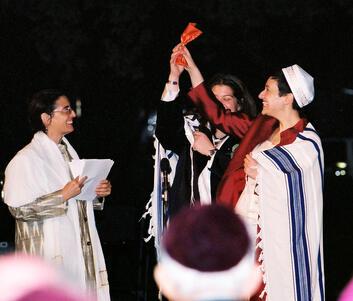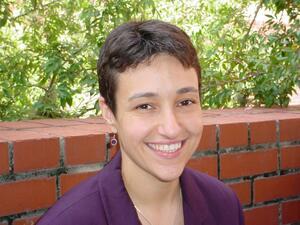Tamara Cohen
This booklet – like so many others from gay and lesbian and feminist weddings, “un-weddings,” commitment ceremonies, brit ahuvim, ceremonies of perpetual engagement, and otherwise named rituals held over the past three decades or so – is a document that attests to the evolving tradition of consecrating relationships largely unimagined by previous generations of Jews.
The booklet is a work in progress. At some point it became clear that the guests were arriving so we had to get to Kinkos copy center. My partner Gwynn and I spent the days before the hectic compilation of these xeroxed sheets with my sister Ayelet, working through theological differences and questions, playing with liturgy, trying to find the right balance of tradition and innovation that would honor each of us and also somehow “work” as powerful liturgy for us and the community that would soon gather. I floated between moments of exaltation at what we were creating and moments of exasperation and tears at the difficulty of it all. We were taking a patriarchal heterosexual ritual that both infuriated me and enticed me with its familiar symbols and authenticating power, and trying to break it down into the tiny pieces of meaning at its core so we could rebuild it in a form that would have meaning for us. The resources we drew upon to create our ceremony included other booklets collected at the weddings and ceremonies of friends and friends of friends; Rachel Adler’s chapter on brit ahuvim from her book Engendering Judaism; material we downloaded from www.ritualwell.org; Gwynn’s extensive knowledge of rabbinic sources and keen critical approach informed by feminist and queer theory; my experience in creating Jewish feminist ritual honed over years of working with Ma’yan; and Ayelet’s expertise as a Conservative rabbi serving Congregation Beth Simchat Torah, New York City’s gay and lesbian synagogue.
I humbly share this booklet and the blessings within it as a document that I hope conveys the seriousness, the delight, and the power that can emerge when Jewish feminists engage with one another, with our tradition, and with our dreams of a freer future from a place of love, courage, and hope.
Tamara Cohen is a Jewish feminist writer, activist and educator. She currently works as the Director of Lesbian, Gay, Bisexual and Transgender Affairs at the University of Florida and the once-a-month Spiritual Leader of the Greater Washington Connecticut Coalition for Jewish Life. In 2004, Cohen directed a national study of Jewish women and feminism for Ma’yan: The Jewish Women’s Project, a program of the JCC in Manhattan for whom she worked as Program Director for many years. While at Ma’yan, she worked in partnership with the Jewish Women's Archive to create the first Women of Valor posters. Cohen has also worked as an educator with Jewish women in the former Soviet Union through Project Kesher. She has served on the boards of Joshua Venture, Brit Tzedek V’Shalom, and Jews for Racial and Economic Justice. She is the editor of the Ma’yan feminist Haggadah, The Journey Continues, as well as an author of numerous articles and poems on Jewish women’s spirituality and feminist approaches to text. Cohen holds a M.A. in Women’s History from Sarah Lawrence College and a B.A. in Women’s Studies and English from Barnard College. She currently lives in Gainesville, Florida, with her partner, Gwynn Kessler.





